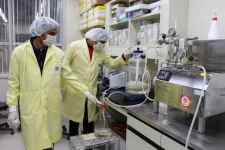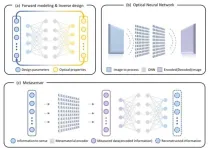(Press-News.org) Executive functions (EFs) have been defined as the ability to regulate emotions, thoughts, and behaviors to achieve a goal. Although EFs have been identified as a cornerstone of cognitive development, knowledge of this fundamental ability in children is primarily based on research with North American and Western European samples from middle to high socioeconomic status.
A new article published in the journal Child Development Perspectives highlights the advances that have been made in developmental EFs research from Latin American
(LATAM) regions, an understudied area that provides a unique context important to understanding EFs. The findings suggest the potential for both universality and cultural specificity in EFs development.
The Society for Research in Child Development (SRCD) had the opportunity to discuss this important research and its implications with author Dr. Lucas G. Gago Galvagno from the Universidad Abierta Interamericana in Buenos Aires, Argentina.
SRCD: What sparked your interest in studying this subject?
Dr. Galvagno: My interest in studying this topic was sparked by a fascination with assessing emotional and cognitive regulation, particularly the capacity for early-life self-regulation. Recognizing self-regulation as a fundamental cognitive ability crucial for explaining overall human development, I became intrigued by the exploration of these skills from the earliest years of life. Understanding how individuals navigate and regulate their emotions and thoughts has profound implications for their overall well-being and success. Additionally, my curiosity extends to exploring the cross-cultural differences in these cognitive capacities, as it intrigues me to unravel how sociocultural and environmental factors shape the development of essential cognitive functions. Unraveling these intricacies promises not only a deeper understanding of individual development but also insights into the varied pathways that shape cognition across different countries and cultures.
SRCD: Can you please provide a brief overview of the study?
Dr. Galvagno: Most studies show consistent developmental patterns in executive function (EF) during the first 12 years, demonstrating increased cohesion, longitudinal stability, age-related improvements, and positive predictions for social and educational outcomes. However, there are also culture-specific variations influenced by sociocultural factors like social vulnerability, income inequality, educational environment, parenting styles, and regional values. To comprehensively understand EF development, a sociocultural lens is crucial, especially when considering cultural influences in Latin American countries. For example, in collectivistic cultures that tend to promote self-regulation and obedience to authorities in home and school education, children control their behavior to meet adult’s expectations. This contrasts with samples of children (1-12 years) from the United States and Western Europe, where children are possibly allowed to express their negative emotions more freely related to signs of assertion promoted in individualistic cultures.
SRCD: What is the primary takeaway?
Dr. Galvagno: The primary takeaway from this study is the recognition of the universality of executive function (EF), but also the intricate interplay between cultural, socioeconomic, and familial factors in shaping the early development of these abilities in children, particularly within the context of Latin America. By embracing this contextualized approach, we can foster more effective and inclusive pathways for supporting the cognitive and emotional development of children, promoting resilience and adaptability across diverse socio-cultural landscapes.
SRCD: Why are these findings important today?
Dr. Galvagno: Understanding the early development of executive functions (EFs) in Latin American contexts is crucial for several reasons. Firstly, replicating and extending findings from studies in Western, Educated, Industrialized, Rich, and Democratic (WEIRD) countries is essential for building a theoretical understanding of EFs that considers diverse backgrounds. Secondly, when creating programs and interventions to promote EFs, it is critical to account for the specific context of children in Latin America, considering factors such as vulnerability, lower overall levels of EFs, and a more collectivist culture. Adjusting interventions to the local context is necessary.
SRCD: How does this research differ from what’s been studied to date?
Dr. Galvagno: This research differs from previous studies in several key aspects. Firstly, it stands out for its specific focus on the development of executive functions (EFs) in the Latin American context, making a unique contribution to existing literature. Many previous studies have predominantly centered on high-income countries, and this research seeks to fill a gap by examining how sociopolitical, socioeconomic, and cultural factors specific to Latin America relate to EF development in children. Secondly, the research distinguishes itself by responding to the call from theorists advocating for a more grounded approach toEF studies in context. By doing so, it provides a more contextualized and specific perspective, recognizing the importance of understanding how the local environment influences children's cognitive development. Furthermore, the research stands out by its emphasis on exploring the relationship between universality and culture-specificity in EF development. This approach allows for discerning common patterns and cultural variations in the development of these cognitive functions, enriching our understanding of diversity in childhood cognitive development.
SRCD: Was there anything that surprised you?
Dr. Galvagno: One aspect that has consistently surprised me in these findings is the profound impact of diverse parenting styles and cultural influences on children's regulatory processes. The ongoing revelation of how different cultural backgrounds and parenting practices shape distinct forms of emotional and cognitive regulation in children continues to be astonishing. Particularly within the Latin American context, characterized by more collectivist societies and higher poverty rates compared to more central countries, children develop specific regulatory mechanisms to navigate the unique demands of their environment. It is fascinating to observe how infants in this context demonstrate adaptive forms of emotional and cognitive regulation influenced by their surroundings. For instance, in families enduring generations of poverty, there tends to be a heightened prevalence of emotional and cognitive dysregulation, also associated with lower levels of parental regulation. Unraveling these nuanced patterns sheds light not only on the resilience of children facing adversities but also on the intricate interplay between cultural and environmental factors that influence the development of essential cognitive skills.
SRCD: Who should know about these findings?
Dr. Galvagno: These findings are relevant and important for various stakeholders involved in child development, education, and policymaking. First and foremost, educators should be aware of these findings as they offer insights into the diverse ways in which children regulate their emotions and thoughts, highlighting the importance of tailoring educational approaches to individual and cultural differences. Parents can also benefit from this knowledge, gaining a deeper understanding of how their parenting styles and the cultural context may impact their child's cognitive and emotional development. Additionally, policymakers should take note, as these findings underscore the significance of considering cultural and socioeconomic factors when designing interventions and support systems for children. Finally, mental health professionals may find these insights valuable in their work, especially when working with individuals from diverse cultural backgrounds or those facing socioeconomic challenges.
SRCD: What’s next?
Dr. Galvagno: More work is needed with diverse groups of participants (children and families from rural areas, Indigenous populations, or populations of mixed ancestry, and in Central America), as well as studies that are larger, longitudinal, and with cross-cultural designs, to expand our understanding and be able to generalize results (Narea, 2016). As work in this area grows, we will be able to consider the interactions among multiple factors in the Latin American context that may affect our understanding of the development of EFs in novel ways.
END
Child Development Perspectives Journal Q&A: Universality of executive functions: A focus on Latin America
2024-03-20
ELSE PRESS RELEASES FROM THIS DATE:
IVI starts technology transfer to Biological E. Limited to manufacture oral cholera vaccine for India and global markets
2024-03-20
IVI will complete the technology transfer by 2025
Oral Cholera Vaccine to be manufactured by Biological E. Limited for India and international markets
March 20, 2024, SEOUL, Republic of Korea and HYDERABAD, India — The International Vaccine Institute (IVI), an international organization with a mission to discover, develop, and deliver safe, effective, and affordable vaccines for global health, today announced that it has commenced a technology transfer of simplified Oral Cholera Vaccine (OCV-S) to Biological ...
Rheumatic diseases associated with childbearing problems
2024-03-20
A new paper in Rheumatology, published by Oxford University Press, finds that rheumatic diseases can lead to reproductive problems, though some conditions have more detrimental effects than others.
Immune-mediated diseases are a varied group of conditions, but each display an aberrant activity of the immune system. Some diseases, such as juvenile idiopathic arthritis and type 1 diabetes, occur mostly before patients reach their reproductive years, but others show up later in life. Scientists have investigated systemic lupus erythematosus for its impact on reproductive health; the condition increases the risk for some adverse pregnancy ...
Machine learning tools can predict emotion in voices in just over a second
2024-03-20
Words are important to express ourselves. What we don’t say, however, may be even more instrumental in conveying emotions. Humans can often tell how people around them feel through non-verbal cues embedded in our voice.
Now, researchers in Germany wanted to find out if technical tools, too, can accurately predict emotional undertones in fragments of voice recordings. To do so, they compared three ML models’ accuracy to recognize diverse emotions in audio excepts. Their results were published in Frontiers in Psychology.
“Here we show that machine learning can be used ...
Self-emergence of stational periodic arrangement of dual microdroplets through quasi one-dimensional confinement
2024-03-20
Polymer systems composed of multiple components can spontaneously induce emulsion or microdroplets by mechanical mixing, as an intermediate state of macroscopic phase separation. Unfortunately, the size of generated droplets is nonuniform and their spatial-arrangement is rather random. In addition, they tend to grow larger with time (coarsening). To prevent the change of the microdroplet size, researchers have currently attempted to rapidly lower the temperature, but these efforts can never improve the uniformity of the droplets. If uniformly arranged homogeneous droplets entrapping certain substrates such ...
Special efforts needed to allow 988 and 911 Systems to work in concert
2024-03-20
Getting the 988 and 911 emergency telephone systems to work in concert requires detailed planning and close cooperation, and such efforts may benefit from having one or two people at the local level who act as champions for interoperability, according to a new RAND report.
In order to make sure callers are routed to the appropriate system, efforts need to involve representatives from both 988 and 911 call centers, law enforcement, mobile crisis teams, peer support specialists, behavioral health specialists, and people who have lived experience
with crisis services, researchers say.
Local champions can aid such efforts by establishing priorities, convening local stakeholders,
brokering ...
Cryoablation highly effective for breast cancer patients with large tumors
2024-03-20
FAIRFAX, Va. (March 20, 2024)—A minimally invasive technique that uses ice to freeze and destroy small, cancerous tumors has now been proven effective for breast cancer patients with large tumors, providing a new treatment path for those who are not candidates for surgery, according to new research to be presented at the Society of Interventional Radiology Annual Scientific Meeting in Salt Lake City.
“For patients who have larger tumors but can’t undergo surgery, this approach could be more effective than the current standard of care for patients who are not surgical candidates,” ...
More hysterectomies can be averted with earlier uterine artery embolization for postpartum hemorrhages
2024-03-20
FAIRFAX, Va. (March 20, 2024)—Early intervention with a minimally invasive treatment called uterine artery embolization (UAE) can help women avoid hysterectomy due to severe bleeding after childbirth, according to a new study being presented at the Society of Interventional Radiology Annual Scientific Meeting in Salt Lake City.
“These findings are important and may help more women avoid hysterectomy and other very serious complications of uncontrolled hemorrhage,” said lead author Younes Jahangiri, M.D., a third-year resident in the interventional and diagnostic radiology program at ...
New treatment option for prostate cancer shows successful outcomes
2024-03-20
FAIRFAX, Va. (March 20, 2024)—A minimally invasive treatment using MRI and transurethral ultrasound instead of surgery or radiation is effective in treating prostate cancer, according to new research to be presented at the Society of Interventional Radiology Annual Scientific Meeting in Salt Lake City. The traditional treatment options of radiation or surgery often come with a risk of side effects, including urinary incontinence and erectile dysfunction that cause significant morbidity and adverse lifestyle effects. Researchers said that some patients now have a durable alternative for whole-gland treatment with MRI-guided transurethral ultrasound ablation (TULSA) that does not preclude ...
ChatGPT is an effective tool for planning field work, school trips and even holidays
2024-03-20
Researchers exploring ways to utilise ChatGPT for work, say it could save organisations and individuals a lot of time and money when it comes to planning trips.
A new study, published in Innovations in Education and Teaching International (IETI), has tested whether ChatGPT can be used to design University field studies. It found that the free-to-use AI model is an effective tool for not only planning educational trips around the world, but also could be used by other industries.
The research, led by scientists from the University of Portsmouth and University of Plymouth, specifically ...
Metamaterials and AI converge, igniting innovative breakthroughs
2024-03-20
A research team, comprising Professor Junsuk Rho from the Department of Mechanical Engineering, the Department of Chemical Engineering, and the Department of Electrical Engineering, and PhD candidates Seokho Lee and Cherry Park from the Department of Mechanical Engineering at Pohang University of Science and Technology (POSTECH), has recently published a paper that highlights the next generation of research trends that combine metaphotonics research with artificial intelligence. The paper has been published in the international journal, Current Opinion in Solid State and Materials Science.
Metalenses have sparked a revolution in optics, drastically ...


